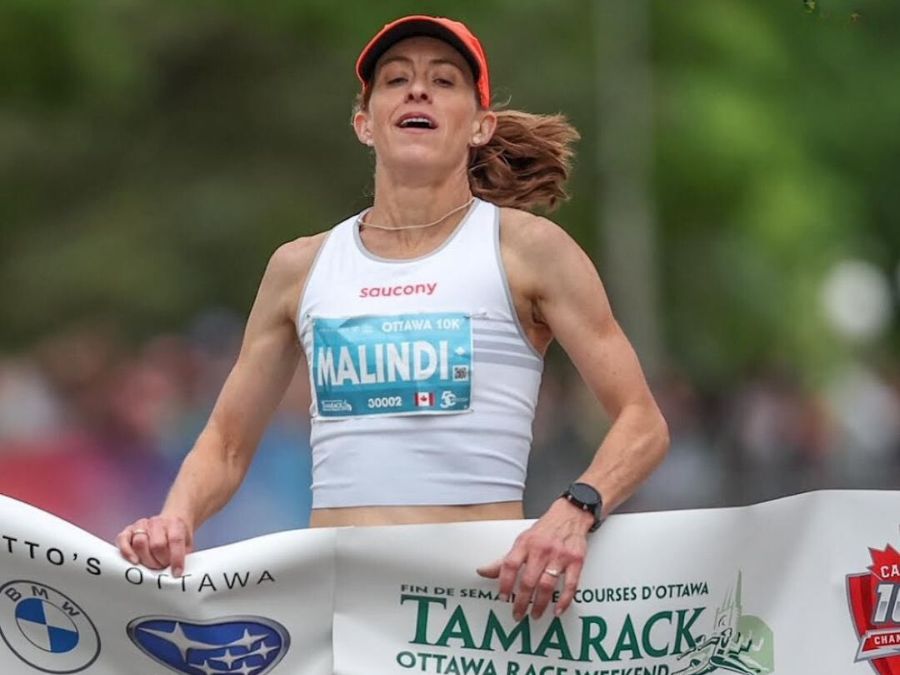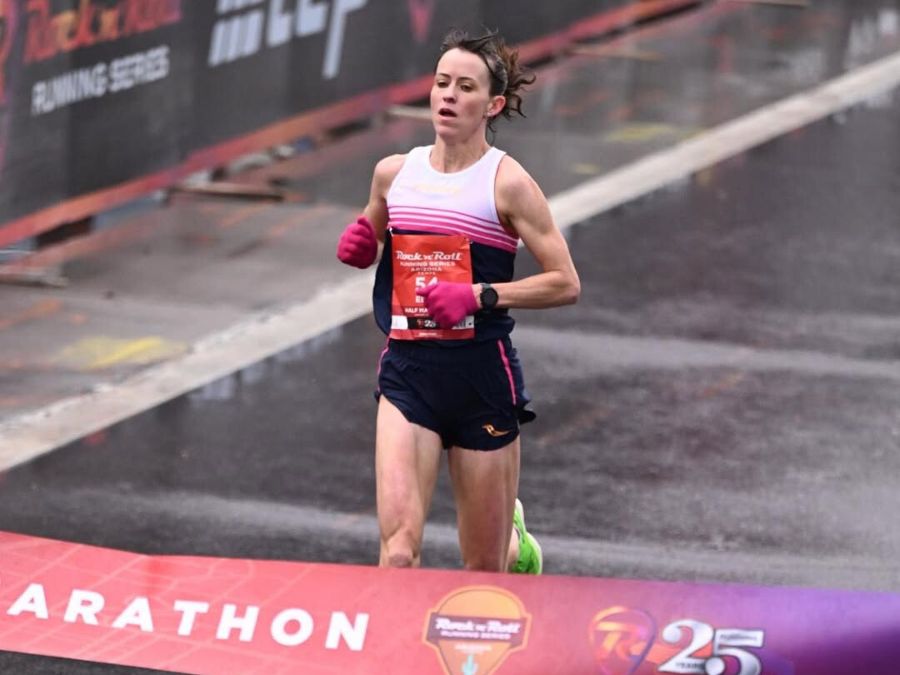In our RT Snap Q&A series, we’ve had the privilege of interviewing some of the world’s best runners, delving into their extraordinary journeys, celebrating their achievements, and exploring the unwavering dedication that defines their careers.
Malindi Elmore
- Born: March 13, 1980
- Nationality: Canadian
- Marathon, 1500m
Malindi Elmore’s journey in athletics is defined by her remarkable evolution from a 1500m runner to one of Canada’s top marathoners. She first gained international attention when she competed in the 2004 Athens Olympics in the 1500m. However, after missing the qualification standards for the next Olympic Games, Elmore transitioned into triathlon. Her success in triathlons, particularly her impressive 2016 Ironman Arizona time, demonstrated her resilience and ability to excel across disciplines. But it was her return to running, specifically the marathon, that marked a major turning point in her career. Elmore debuted in the marathon in 2019 with a strong 2:32:15 finish at the Houston Marathon, signaling her potential for Olympic-level competition
Elmore’s breakthrough came in 2020 when she shattered the Canadian women’s marathon record at the Valencia Marathon with a time of 2:24:50. This performance cemented her place in Canadian marathon history, setting her up as a contender on the world stage Elmore’s dedication to her craft paid off again when she finished 9th in the marathon at the Tokyo 2020 Olympics, making her the highest-placing Canadian in the event since the 1988 Seoul Olympics. With her husband and former Olympian Graham Hood as her coach, she continued to thrive in her marathon career, balancing her athletic commitments with being a mother of two
As of 2023, Elmore remains focused on the Paris 2024 Olympics, where she has already qualified with a time of 2:23:30. Her continued success in the marathon, along with her ability to inspire through coaching, showcases her lasting influence on the sport. Elmore’s career serves as an example that age and experience can be powerful assets in distance running, and she is eager to build on her past achievements with another top-10 Olympic finish.

Personal Bests
- Marathon – 2:23:30
- 1500 Metres – 4:02.64
- Mile Short Track – 4:31.03
- 5000 Metres – 15:12.12
- 3000 Metres Short Track – 8:57.59
- 3000 Metres – 8:51.90
- Half Marathon – 1:10:11
- 4×1500 Metres Relay – 17:36.66
- 800 Metres – 2:02.69
- Mile – 4:30.70
- 10 Kilometres Road – 32:44
- 5 Kilometres Road – 15:40
- 10,000 Metres – 33:08.66
- 800 Metres Short Track – 2:08.78
- 1500 Metres Short Track – 4:23.74
- 1000 Metres – 2:48.66
RT: You’ve been able to juggle your career and motherhood successfully. How do you manage training and family life, and how has being a mother changed your perspective on your athletic career?
Malindi: Kids definitely change things in (mostly!) a good way. I think any parent will tell you that you need to be really flexible but also still committed if you are going to be successful as a parent athlete. If a kid needs me unexpectedly and I can’t do a workout or run as planned, what’s Plan B? I did so much of that when they were little, and so much could quickly derail my plans: nap strikes, unplanned naps, illness, or just general “needing mom” days would complicate my training. So, I would have to change to a treadmill run, go later in the day, take a stroller, shift it to the following day or evening, or come up with some other “Plan B, C, D.”
View this post on Instagram
My kids are older now, so it’s easier, and now I can even sneak out for 30 minutes while they are home alone, so that’s a game changer. I do a lot of my easy runs now after I drop them off at their activities and just squeeze it into the spaces in my day. Sometimes I have a double day with only 2-3 hours between my runs because that’s what the day’s plan allows. I try to keep two things in mind: my kids are always the priority, but I also commit to making my running happen every day, except in the case of extenuating circumstances, as I know it’s important to me and good for the kids and family too.
RT: Training for the marathon requires immense physical and mental strength. Can you walk us through a typical week of your marathon training, especially as you prepare for major races?
Malindi: We aim for a 10-week build and a two-week taper in our marathon blocks. I aim for 150-170 km of running in my typical peak marathon weeks, so about 6-8 of the 10 weeks. We have a few lighter weeks, especially if there is a race on the schedule. I take a day completely off every 3-4 weeks. I do a lot of easy running, double days, and typically two quality sessions a week. One may be a fartlek or double threshold day, and the other is generally a long run with varying amounts of “marathon pace effort” incorporated into the run, ranging in the 35-38 km range. I also do weights twice a week.
View this post on Instagram
RT: You’ve faced numerous challenges, from injuries to balancing family life with your training. What has been the most difficult hurdle you’ve overcome in your career, and what did you learn from that experience?
Malindi: After running at this level for 20+ years, I have definitely had my share of challenges and injuries. The hardest period for me was 2008 when I was close to making the Olympic team for the 1500m in Beijing. I had the IAAF (now called World Athletics) A standard for the Olympics, but Athletics Canada required a harder internal standard for qualifying. I ended up missing it by 0.07 seconds and didn’t make the team. A few weeks later, and only three weeks from the beginning of the Games, five women were suspended for doping violations in the women’s 1500m, and those spots were not replaced at the Games. The same thing essentially repeated in 2012, with five of the top twelve finishers in the women’s 1500m final Olympics having since been banned.
View this post on Instagram
The impact of doping in the sport results in clean athletes missing Olympic teams, sponsorships, and opportunities to compete in big races to run fast, etc. It is also so hard to be in a race and get your socks blown off in the last 200m against people with unfair advantages. It led to my retirement from the track in 2012 because I was so frustrated and had lost my love of running and competing through the stress. However, when I picked up running again seven years later, I focused on keeping it process-oriented and fun. While doping still exists, I just have to focus on my best.
RT: As a coach and athlete, you’ve seen both sides of the sport. What elements of your training philosophy do you emphasize the most when helping others improve their running performance?
Malindi: I try to focus more on the process — training, preparation, and enjoyment — rather than outcomes. I have big goals, and those are fun to achieve, but you need to nail the process and find the training and racing intrinsically rewarding if you are going to get the most out of yourself.
RT: Given your wealth of experience, what’s one piece of advice you wish you could give to your younger self as you first started your running career?
Malindi: I have always had a hard time with pre-race nerves, and it used to be debilitating. I still get nervous, but I try to frame nerves as excitement and curiosity about what I can achieve instead of pressure or stress from a fear of (internally driven) failure. After finishing 35th at the Olympics, I was disappointed, but my son took my hand and said to me, “Mom, you might be disappointed in your race, but I am SO proud of you.” So, I try to keep that in mind — making my kids, family, and friends proud that I gave it my best effort and accepting the results that come.
View this post on Instagram
RT: Your record-breaking marathon performance in Houston was a career- defining moment. What key factors contributed to that race being one of your finest, and how did you mentally approach the race in the days leading up to it?
Malindi: I was back to racing seriously after a seven-year break, so I really felt fresh and grateful for the opportunity to race again at that level. I had a great training block and was fit and confident. About 10 km into the race, the sun was just starting to peek through during the morning’s dawn, and I thought, “Wow, there is nothing I would rather be doing right now.” It was such a wonderful and meditative moment that I often think back to that moment as the one I want to capture in races again.
View this post on Instagram
RT: Having had such a diverse career in both triathlon and marathon running, what advice would you give to young athletes who dream of reaching the highest level in their sport while managing the many aspects of life outside of competition?
Malindi: I think you can be successful in many areas of life and that you don’t need to sacrifice all areas of interest and ambition to be successful in one. I see many athletes so focused on running that they don’t allow themselves to have fun or pursue other interests (academic, career, family, hobbies, etc.), and then they eventually reach burnout or feel the need to move on because running becomes too significant a piece of their identity and investment. I am at my best when I prioritize running, but I also have other things to help keep balance and perspective.



